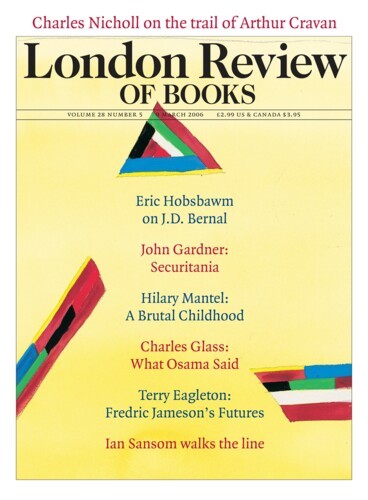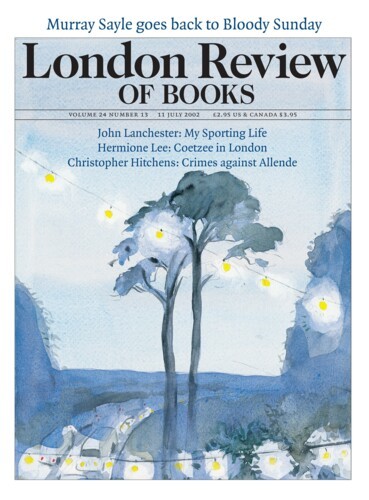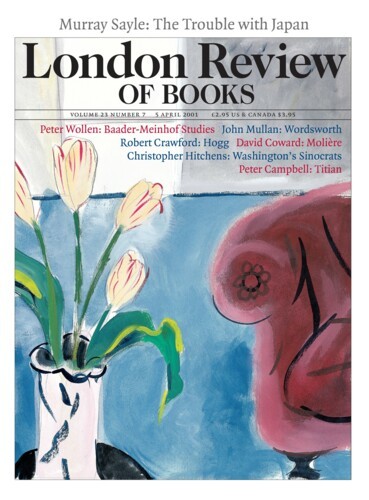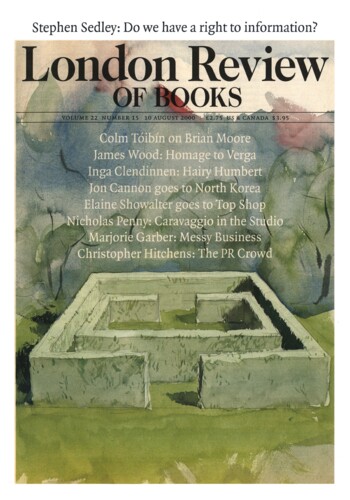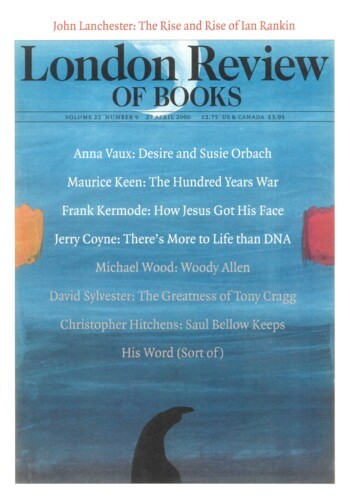Christopher Hitchens
Christopher Hitchens, who died in 2011 at the age of 62, wrote several dozen pieces for the LRB between 1983 and 2002. A Hitch in Time, a collection of some of them, is published by Atlantic.
11 September 1973: Crimes against Allende
Christopher Hitchens, 11 July 2002
I have a more or less fixed memory of the end of the Sixties. In the autumn of 1970 I went to join a strike picket at the General Motors plant in Fremont, California. Handy for Berkeley and Oakland, the factory was one of the salients of a national labour shutdown that was scheduled to begin at 12 o’clock at night. In the ranks of supporters were hardened veterans of the battle against...
Done Deal: Nixon in China
Christopher Hitchens, 5 April 2001
Henry Luce – who coined the catchphrase about ‘the American Century’ – once said that the crucial event of that century would be the Christianisation of China. He meant the Protestant evangelisation of China; it would have been no less absurd to propose the conversion of the Chinese to Judaism, but there was a time when millions of American homes gave little...
Performing Seals: The PR Crowd
Christopher Hitchens, 10 August 2000
A man I met told me that F.R. Leavis had once been invited to Columbia University to talk, and was afterwards bidden to a reception in his own honour. The co-editor of Scrutiny had been very much himself and, after his departure, was discussed as visitors tend to be. A certain elderly member of the English Department even observed: ‘He seemed perfectly all right to me. I can’t think why everybody calls him “Queenie”.’‘
The Egg-Head’s Egger-On: Saul Bellow keeps his word (sort of)
Christopher Hitchens, 27 April 2000
Novelists can be lucky in their editors, in their friends, in their mentors and even in their pupils. Sometimes they are generous or sentimental enough to fictionalise the relationship. In Keep the Aspidistra Flying, George Orwell gave his friendless, dowdy and self-pitying protagonist Comstock one true pal: the editor and patron Ravelston, proprietor of the small yet reliable magazine Antichrist. This Ravelston – some composite of Sir Richard Rees and John Middleton Murry – was a hedonistic yet guilt-ridden dilettante, good in a pinch, and soft on poets, but too easily embarrassed by brute exigence. Saul Bellow – who has already shown a vulnerability to exigent poets in his wonderful Humboldt’s Gift – now presents us with Ravelstein, a hedonistic kvetch who manifests patience towards none. As is known to all but the meanest citizens of the republic of letters, the novel is an obelisk for the late Allan Bloom, author of the 1987 shocker The Closing of the American Mind. This book, which was a late product or blooming of the University of Chicago Committee on Social Thought, argued that the American mind was closed because it had become so goddamned open – a nice deployment of paradox and a vivid attack on the relativism that has become so OK on campus these days. Bloom’s polemic swiftly became a primer for the right-wing Zeitgeist; a bookend for the shelf or index sternly marked ‘all downhill since 1967’. And even then, there were those who detected a Bellovian lending, or borrowing as the case might be.’‘
Pieces about Christopher Hitchens in the LRB
It’s Been a Lot of Fun: Hitchens’s Hitchens
David Runciman, 24 June 2010
In his book about religion, Peter Hitchens has a lot more to say about his brother Christopher than Christopher has to say about Peter in his book about himself.* ‘Some brothers get...
The Positions He Takes: Hitchens on Paine
John Barrell, 30 November 2006
‘If the rights of man are to be upheld in a dark time, we shall require an age of reason,’ wrote Christopher Hitchens last year on the dust jacket of Harvey Kaye’s recent book...
‘No Bullshit’ Bullshit: Christopher Hitchens, Englishman
Stefan Collini, 23 January 2003
Winning is very important to Christopher Hitchens. Dr Johnson was said to ‘talk for victory’, and by all accounts it seems the same might be said of Hitchens. He certainly writes for...
How would Richelieu and Mazarin have coped? Henry Kissinger
R.W. Johnson, 20 September 2001
In this short book, Christopher Hitchens sets down the main charges against Kissinger: murder, violation of human rights and complicity in mass atrocities on a scale equalled only by Eichmann,...
Mendacious Flowers: Clinton Baiting
Martin Jay, 29 July 1999
‘The crude commercialism of America, its materialising spirit, its indifference to the poetical side of things, and its lack of imagination and of high unattainable ideals are entirely due...
Why Calcutta?
Amit Chaudhuri, 4 January 1996
Among the welter of images and mythologies that constitute the middle-class Bengali’s consciousness – P3 and Ganesh underwear, the Communist hammer and sickle, Lenin’s face,...
Against it
Ross McKibbin, 24 February 1994
Christopher Hitchens may not be ‘the nearest thing to a one-man band since I.F. Stone laid down his pen’, but he comes close. For the Sake of Argument records a life of action, of...
Further Left
R.W. Johnson, 16 August 1990
Many years ago it was the habit of the PPE tutors in Magdalen College, Oxford to hold a discussion group for their undergraduates. At one such meeting we were somewhat disconcerted to find we had...
Royalties
John Sutherland, 14 June 1990
Deference to royalty in this country is enforced by a judicial and popular savagery which is always there but only occasionally glimpsed. The glimpses are instructive. In 1937 the diplomat...
Opportunities
David Gilmour, 1 June 1989
Hitchens was right to go West. He needed lusher plains of political corruption across which to spread himself. He needed a country of wide horizons and myopic international vision. And he needed...
Passionate Purposes
Keith Kyle, 6 September 1984
There used to be a type of book known as the ‘Secret History’ of some international problem. With some passion, extensive citation of material, and a somewhat self-regarding manner,...
Read anywhere with the London Review of Books app, available now from the App Store for Apple devices, Google Play for Android devices and Amazon for your Kindle Fire.
Sign up to our newsletter
For highlights from the latest issue, our archive and the blog, as well as news, events and exclusive promotions.
